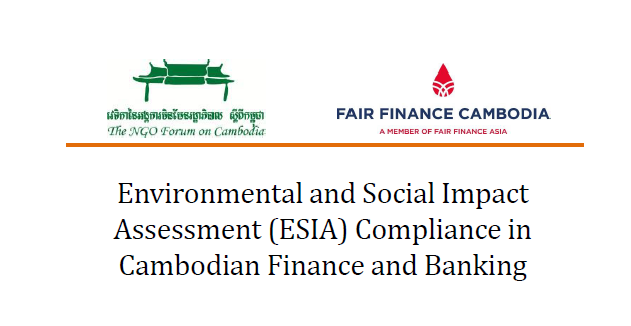
The report identifies several solutions and measures needed to promote the joint implementation of ESIA for loans or credit with potential ecological and socio-cultural risks.
Banking and financial institutions are essential sources of capital for investments in developmental projects. Although financing these projects is economically beneficial, their potential environmental and social consequences require serious contemplation. Institutions that lend to development projects are indirectly responsible for the damages to resources from the project’s activities. Customarily, banks’ scrutiny of borrowers is limited to financial evaluation to determine loan-repayment capabilities without considering potential environmental impacts. This lack of ecological and social accountability severely affects resources and may cause the project’s failure, ultimately leading to loan defaults.
Cambodian banking and financial institutions have not implemented ESIAs as pre-conditions to approve potentially risky loans. In contrast, several international banks (such as the ADB, WB, and IFC) have developed strong safeguard policies on the environment, forests, resettlement, indigenous peoples, cultural legacies, and regions in conflict as preconditions for approving loans. The lack of enforcement of similar safeguards in the Cambodian banking and financial sector is particularly concerning. Credit from this sector has contributed extensively to many development projects that have damaged resources or led to conflicts with local populations.
The study results presented in this report demonstrate the disconnect between the financial sector and the implementation of environmental policies, even though some institutions have begun to integrate awareness and obligations towards ecological and social responsibilities. In response to these shortcomings, the report identifies several solutions and measures needed to promote the joint implementation of ESIA for loans or credit with potential ecological and socio-cultural risks.
Disclaimer: The content of this publication is the sole responsibility of Fair Finance Cambodia and can in no way be taken to reflect the views of the Fair Finance Asia/ Fair Finance International network.
About Fair Finance Cambodia
The Fair Finance Cambodia (FFC) coalition aims to reduce the negative impacts of cross-border investments on human rights, the environment and climate change, particularly those made by multinational financial institutions, banks and insurers while increasing inclusive economic development. FFC is operational in Cambodia – wherein the Fair Finance Cambodia Civil Society Organization (CSO) coalition leads research and engagement with key stakeholders, including financial regulatory and policymaking institutions, banking and investment associations, multilateral development banks and academia. FFC is a member of Fair Finance Asia, a regional network of CSOs committed to ensuring that financial institutions’ funding decisions in the region respect local communities’ social and environmental well-being.